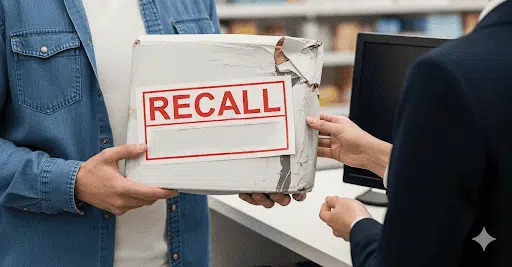What type of injury have you suffered?
Car Accident
- Car Accident
- Head Injury
- Premises Liability
- Products Liability
- Truck Accident
- Wrongful Death



HABLAMOS ESPAÑOL
(877) 880-4090Posted September 16, 2025 | Personal Injury Blog

When a product on the market is found to be dangerous or defective, a recall may be issued to protect consumers. Recalls can either be issued voluntarily by a company or mandated by a government agency.
Understanding the difference between voluntary and mandatory recalls can play a critical role in your personal injury case. In this article, we break down the main differences between voluntary and mandatory recalls. We will also discuss how they can impact liability in a product-related injury case.
A product recall is a request to return, repair, or replace a product after it has been found to pose a safety risk or fail to meet regulatory standards. Between the years 2012 and 2024, the Food and Drug Administration (FDA) has recalled 94,288 products.
Recalls can apply to food, medical devices, toys, vehicle parts, and almost any other consumer product.
A voluntary recall occurs when a manufacturer or distributor initiates a recall without being formally ordered to do so by a government agency. They do this to minimize liability and maintain customer trust.
These are the typical steps in a voluntary recall:
Voluntary recalls can happen quickly, which may reduce the number of injuries and incidents. However, just because a recall is voluntary doesn’t mean it’s any less serious.
A voluntary recall may demonstrate that a company is taking consumer safety seriously. However, this action does not absolve the manufacturer from responsibility for injuries caused by the defective product.
Courts may view a voluntary recall as proof that the company knew or should have known of the danger. This evidence can be used to support claims of negligence or strict liability.
Additionally, if a company delays in issuing a voluntary recall, it may be held more accountable for injuries occurring during that time.
A mandatory recall is ordered by a government agency after a company fails to address a known safety issue voluntarily. Agencies like the CPSC or the FDA have legal authority to compel companies to recall dangerous products when voluntary action is not taken or found to be insufficient.
Mandatory recalls are usually done as a last resort. They often follow extensive investigation and are a clear indication that the product poses a serious risk.
A mandatory recall typically demonstrates that the manufacturer failed to act in a timely or responsible manner. This can strengthen your product liability case, suggesting gross negligence or willful disregard for consumer safety.
Your lawyer may be able to demonstrate that a company resisted a recall or concealed known dangers. A court may award punitive damages in addition to compensatory damages.
Mandatory recalls often lead to the company being fined and penalized. This can further support your argument that the product was unreasonably dangerous.
Have you or a loved one been harmed by a recalled product? Whether the recall was voluntary or mandatory, a lawyer can be essential to protecting your rights and helping you pursue compensation.
Your lawyer will thoroughly investigate whether the product was defective and whether the defect caused your injuries. He or she may work with experts to analyze product design, manufacturing processes, and recall documentation.
Identifying the liable party is critical in any personal injury case.
In product liability cases, multiple parties may be responsible, including:
The type of recall may also indicate whether the company acted negligently or tried to hide a known risk.
An experienced product liability lawyer will gather essential evidence like:
This evidence will be used to build a solid personal injury case on your behalf.
Personal injury attorneys can help you recover damages for:
Importantly, pursuing legal action sends a message to corporations that safety should always come first. Whether a recall is voluntary or mandatory, your case can contribute to public awareness and safer product standards.
As a victim of a defective product, you may be able to recover compensation through a class action lawsuit or an individual personal injury claim. Let’s discuss the difference between the two.
A class action is filed on behalf of a large group of people who have been similarly harmed by the same product. These cases often seek collective damages for things like medical expenses, refunds, or punitive damages.
A potential downside of a class action is that a settlement usually gets split among all the people involved, so individual payouts can be small.
An individual lawsuit is filed by a single person or family and is often the best option when your injuries are severe. These cases allow for compensation tailored directly to you specifically, including pain and suffering and future medical care.
The payout of the settlement is often higher because it is not divided among multiple parties.
At Fielding Law, we are committed to holding manufacturers accountable for unsafe products. Whether the recall was voluntary or mandatory, you deserve answers and fair compensation. Our legal team can guide you through the complex legal process and help ensure your rights are protected.
A personal injury lawyer can help you figure out who is at fault, explain your legal options, and work to get you fair compensation. We take all personal injury cases on contingency, which means you don’t pay any upfront costs or fees.
If you or a loved one has been injured by a recalled product, don’t wait to act. Contact Fielding Law today to speak with a skilled personal injury attorney and get the justice you deserve.

Text edited by Mitchell Fielding, a personal injury lawyer and partner at Fielding Law. Mitchell is known for his hard work ethic, friendly personality and dedication to the law. You can find out personal injury law offices in Taylorsville, UT and Mesquite, TX.